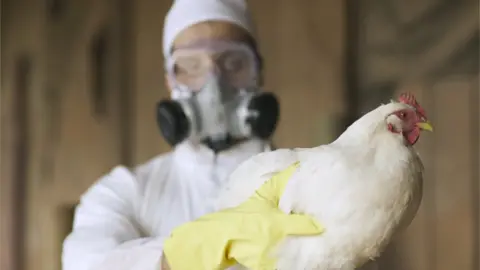Northern Ireland faces 'significant' Avian flu threat
 Getty Images
Getty ImagesThe threat from avian flu in Northern Ireland "will be more significant in the months ahead", the agriculture minister has warned.
It followed the identification of a number of suspected cases in commercial, privately-owned and wild birds.
Edwin Poots said it was a "present" threat and his department would watch for the impact of winter migration.
Last week, 27,000 ducks were culled after an outbreak in County Tyrone.
Mr Poots said the value of this "very significant outbreak" at a commercial business in Aughnacloy would be between £500k and £1m.
Northern Ireland's chief veterinary officer, Robert Huey, said the cull would include the site's "entire breeding stock" and despite the offer of compensation the business would "take some time to recover".
'Devastating impact'
The minister said people who keep birds as pets needed to be "very cautious" after suspected cases were found in a "backyard flock" in Broughshane in County Antrim.
"This isn't just something for the commercial farmers, it's those people as well, so their flock has been wiped out of around 30 birds," he told BBC News NI's Good Morning Ulster.
On Sunday, the department confirmed that avian flu had also been detected in six wild birds found in Belfast Waterworks, Harbour Estate and in Carryduff.
Allow Twitter content?
The department advised that the public should not "touch or pick up any dead or visibly sick birds".
On Monday, Mr Poots said owners should take actions such as handwashing, changing boots when entering the area were birds are housed and changing into disposable boiler suits as means to avoid the spread of the virus.
"We can't stress enough that people need to do that, not just once or twice, every time," he explained.
"While they might get bored doing it and think it's overkill, it will not be overkill if this arrives into your flock because it will wipe your flock out. It has a devastating impact."
The minister warned that avian flu is "hugely present in England" and there had also been recent outbreaks in County Monaghan.
